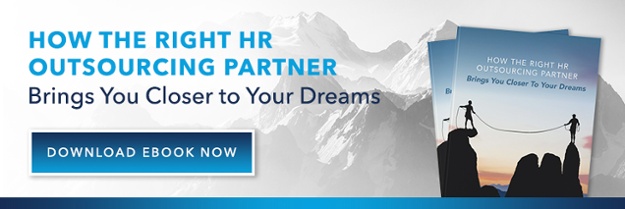.jpg)
HR outsourcing is rapidly growing in popularity, with payroll as one of the most outsourced functions. The average ROI of comprehensive outsourcing solutions, such as Professional Employer Organizations (PEOs), is known to be positive.
What is less clear is whether simply outsourcing payroll alone can generate a positive ROI. This depends in large part on the abilities of your in-house HR team.
Can the ROI of Outsourcing Payroll be Positive?
There are, in fact, cases when outsourcing payroll leads to a tangible, positive ROI. However, in most cases, the primary ROI comes from intangible time savings. That is to say, the primary benefit of outsourcing payroll is that it frees your HR team to handle more important matters.
You will gain tangible if your team is not very good at payroll. If your in-house team is consistently late with payroll or makes mistakes. Mistakes can lead to expensive compliance failures, resulting in fines and lawsuits.
The other factor to consider is what your HR team is doing if they are not engaged in payroll. In some small companies, payroll is being handled by employees who would otherwise be engaged in revenue-generating activities. In other cases, HR may have opportunities to improve cash flow if they are not handling payroll.
How Can You Measure the ROI of Payroll Outsourcing?
Another issue with the ROI of payroll outsourcing is that it can be extremely hard to measure. Doing so starts with determining how productive your current payroll system is. Many companies don't know how long it takes for HR staff to do payroll, although typical estimates are a few hours per pay period (whether this is the typical biweekly or another time period).
You should begin by measuring how long it takes to:
- Collect timesheets and other data to run payroll.
- Perform a pay run.
- Identify and resolve any payroll errors.
- File payroll taxes and finish up.
The more accurate your timesheets and tax withholdings, the faster payroll will run and the lower your compliance costs. If your staff does not have a good system for doing payroll, then it will take longer. Another factor to consider is the technology you are using. A lot of small businesses manually import timesheets. This obviously slows everything down. It's better to have payroll software that integrates with time and attendance, but this software can be expensive. While it pays for itself in the long term, it is not always possible to absorb the upfront costs.
Once you have "audited" your current process, you can multiply the time needed by the salaries of the staff involved in these processes. Then, calculate the revenue generated when HR staff are focusing on other activities and subtract that from payroll productivity cost. You can directly compare that with how much the payroll service is charging.
What is the ROI of Payroll Outsourcing?
The ROI of payroll outsourcing is considerably lower than the average ROI of more comprehensive HR outsourcing services such as professional employer organizations. PEOs have an average ROI of 27.2%.
For companies with less than 500 employees and high productivity costs, you can achieve a positive ROI by outsourcing payroll processing alone. Additionally, doing so can often increase the morale of your HR department by freeing them from tasks which are often tedious, yet require a high degree of focus and concentration.
However, once you hit around the 500 employee mark, the cost savings diminish greatly, and ROI rapidly declines and can become negative fairly quickly. This is partly because payroll processors often base their rates on either your number of employees or your total payroll amount. It is also partly because a company of that size usually has an expensive HR expert to do payroll.
Why are PEOs a better option for payroll outsourcing?
Payroll alone might be a solution for some smaller companies. However, for most companies, an HR outsourcing option that is more comprehensive will provide a stronger ROI in both tangible and intangible savings. This is where PEOs come in.
Partnering with a PEO means that you can hand off the worst administrative burdens of HR, including payroll and benefits administration, leaving HR free to work on strategic matters, building a company culture, etc. At the same time, you gain additional tangible cost savings from having access to the PEO's master benefits plan, significantly reducing your healthcare costs while allowing you to provide quality, competitive benefits.

Wendy Katz
Wendy Katz is the Chief Financial Officer at Questco Companies. Wendy is aiding our clients’ drive for profitability and compliance by providing pragmatic insights and sound financial solutions to constantly evolving HR challenges.



